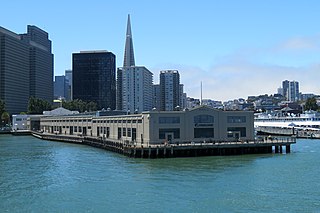
In commerce, supply chain management (SCM) deals with a system of procurement, operations management, logistics and marketing channels, through which raw materials can be developed into finished products and delivered to their end customers. A more narrow definition of supply chain management is the "design, planning, execution, control, and monitoring of supply chain activities with the objective of creating net value, building a competitive infrastructure, leveraging worldwide logistics, synchronising supply with demand and measuring performance globally". This can include the movement and storage of raw materials, work-in-process inventory, finished goods, and end to end order fulfilment from the point of origin to the point of consumption. Interconnected, interrelated or interlinked networks, channels and node businesses combine in the provision of products and services required by end customers in a supply chain.

Logistics is the part of supply chain management that deals with the efficient forward and reverse flow of goods, services, and related information from the point of origin to the point of consumption according to the needs of customers. Logistics management is a component that holds the supply chain together. The resources managed in logistics may include tangible goods such as materials, equipment, and supplies, as well as food and other consumable items.

A supply chain is a complex logistics system that consists of facilities that convert raw materials into finished products and distribute them to end consumers or end customers. Meanwhile, supply chain management deals with the flow of goods in distribution channels within the supply chain in the most efficient manner.

Ryder System, Inc. is an American transportation and logistics company, specializing in truck rental and leasing, fleet management, supply chain management, and transportation management. It also offers full-service leasing, rental and maintenance, used vehicle sales, transportation management, professional drivers, e-commerce fulfillment, and last-mile delivery services. The company is headquartered in Coral Gables, Florida, and operates in the United States and United Kingdom.
Toll Group operates a logistics and global freight forwarding network spanning 150 countries, with over 20,000 customers. Toll has more than 16,000 team members across 500 sites.
A supply network is a pattern of temporal and spatial processes carried out at facility nodes and over distribution links, which adds value for customers through the manufacturing and delivery of products. It comprises the general state of business affairs in which all kinds of material are transformed and moved between various points to maximize the value added for customers. In the semiconductor industry, for example, work-in-process moves from fabrication to assembly, and then to the test house.
Infor Nexus is an independent business unit of Infor LLC offering a multienterprise supply chain network. The on-demand global supply chain management platform and integrated applications are used worldwide by businesses to manage global direct procurement, supplier networks, global logistics and global trade processes. Founded in 1998, in Oakland, California, it merged with TradeCard in 2013, and in September 2015, GT Nexus was acquired by Infor. Today, Infor Nexus is a business unit of Infor.
Blue Yonder Group, Inc. is an American supply chain management company operating as an independent subsidiary of Panasonic. Founded in 1985, the company is headquartered in Scottsdale, Arizona, with offices globally. Its acquisitions have included Yantriks, RedPrairie, i2 Technologies, Manugistics, E3, Intactix, and Arthur.

The Navy Supply Corps School (NSCS), located in Newport, Rhode Island, comprises a 20-week training "Basic Qualification Course" (BQC) and other courses for newly commissioned and other Supply Corps officers in the US Navy. Those who successfully complete the courses are designated Ready for Sea in the Navy Supply Corps.

Exel was a supply chain and logistics company operating in North America and Europe, which became a subsidiary of the German firm Deutsche Post in 2005. It reported annual revenues of about $4.2 billion in February 2012.

Wolfgang Lehmacher is an international expert, thought leader, technology evangelist, and practitioner in the field of supply chain, transport, and logistics. He has been involved in various transformational initiatives in the industry. The seasoned executive with vast global industry experience anchored in dozens of positions in management and on boards of directors is also a prolific writer and regular speaker at events all across the globe. Important roles include president and CEO of GeoPost Intercontinental, the global investment and expansion vehicle of French La Poste, and director, head of Supply Chain and Transport Industries at the World Economic Forum. The business mentor is advisor to RISE and Global:SF, a not-for-profit organization dedicated to paving the way for international companies to locate, invest, and grow in the San Francisco Bay Area while helping local companies expand into global markets. As an advocate of the circular economy, he is involved in CIRPASS, an EU-funded digital product passport initiative. He also is a member of the Ethical Committee that informs Dynex Moonshots, the investment, strategic, and ethical steward of the Dynex Ecosystem. Dynex is the world's only accessible neuromorphic quantum computing cloud. Jointly with other experts and academics he also conducts surveys like a Claros study, a new method that starts with a ChatGPT-generated list of issues validated by a pool of experts, yielding actual schools of thought in the maritime industry. With his engagement in numerous publications, including the books Wie Logistik unser Leben prägt, Logistik im Zeichen der Urbanisierung, Disrupting Logistics - Startups, Technologies, and Investors Building Future Supply Chains, Circular Economy, and Maritime Decarbonization he contributes to the public discourse. Many of his books have been published at Springer Gabler. He is a Financial Times, Nikkei Asian Review, Business Insider, World Economic Forum Agenda and BVL-Blog contributor. Lehmacher contributes to a broad range of papers, such as "How Technology Can Unlock the Growth Potential along the New Silk Road", "Blockchain Technology for Ports", "Impact of the Fourth Industrial Revolution on Supply Chains", "Trade Tech – A New Age for Trade and Supply Chain Finance", and “Reducing port city congestion through data analysis, simulation, and artificial intelligence to improve the well-being of citizens”. Lehmacher is the lead author of the “Practical Playbook for Maritime Decarbonisation”.

CaseStack was an American company that provided supply chain management (SCM) services, including warehousing, transportation, and supply chain management software (SCMS) to consumer packaged goods companies (CPGs). It used a proprietary software as a service platform for its collaborative retailer consolidation programs. CaseStack has been recognized in Food Logistics' Top 85 3PL Providers, Global Logistics & Supply Chain Strategies 100 Great Supply Chain Partners and Inbound Logistics' Top 100 3PL Providers.

John Anthony Harvey is a British entrepreneur and logistician whose seminal contribution was to lead the intercontinental logistics service provider Tibbett & Britten Group plc during a 20-year period of diversification and growth. He is an Ambassador, and former Chairman of the Trustees, of Transaid Worldwide - the international transport charity. Since 2004 he has Chaired The Keswick Enterprises Group Limited, a UK-based private equity investor.
Third-party logistics is an organization's long term commitment of outsourcing its distribution services to third-party logistics businesses.
John Galt Solutions is a software company that provides forecasting and supply chain management software.
Sterling Commerce was a software and services company providing Omni-Channel Commerce, B2B including Electronic data interchange (EDI) translation software and one of the first B2B Integration platforms and managed file transfer ("MFT") products such as Connect:Direct. Sterling Commerce was headquartered near Columbus, Ohio in Dublin, Ohio. SBC Communications acquired Sterling Commerce, then SBC merged with AT&T, who sold Sterling Commerce to IBM. Sterling Commerce's Columbus, Ohio campus is now an IBM facility.

Prologis, Inc. is a real estate investment trust headquartered in San Francisco, California that invests in logistics facilities. The company was formed through the merger of AMB Property Corporation and Prologis in June 2011, which made Prologis the largest industrial real estate company in the world. As of December 2022, the company owned 5,495 buildings comprising about 1.2 billion square feet in 19 countries across North America, Latin America, Europe, and Asia. According to The Economist, its business strategy is focused on warehouses that are located close to huge urban areas where land is scarce. It serves about 6,600 tenants. Prologis began to expand its non-real estate business, Essentials, in 2022, offering customers solar power, racking systems, forklifts, generators, EV charging infrastructure, and other logistics tech equipment for purchase.
MISI University, formerly known as Malaysia Institute for Supply Chain Innovation (MISI), is a supply chain focused university located in Shah Alam, Selangor, Malaysia. The university was launched as a joint initiative between the Massachusetts Institute of Technology (MIT) and the Government of Malaysia on March 22, 2011.
David Simchi-Levi is an American academic working as a Professor of Engineering Systems at Massachusetts Institute of Technology. He is also the founder or co-founder of several companies. Simchi-Levi's research focuses on supply chain management, revenue management, and business analytics.
Supply chain resilience is "the capacity of a supply chain to persist, adapt, or transform in the face of change".










